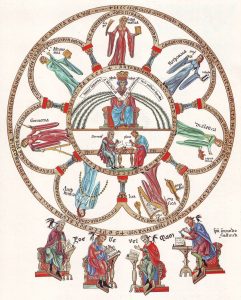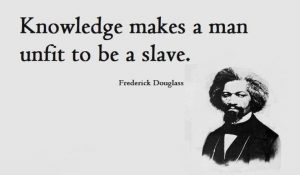MDVL 301: European Literature from the 5th to the 14th Century
“
The Liberal Arts”
(3 credits, 2016-17, winter session, term one: September to December 2016)
INSTRUCTOR: Dr Juliet Ó BRIEN
Office: 728 Buchanan Tower
Email: juliet.obrien@ubc.ca
Office Hours: Monday, Tuesday, Wednesday, and Thursday 14:30 – 16:30
Class time & place:
Tuesday & Thursday 13:00-14:20
Frederic Lasserre room 105
DESCRIPTION
“The function of freedom is to free someone else.” (Toni Morrison)
What is a liberal arts education? A course in the Faculty of Arts? What does it mean to be a student at a university? What’s the point of reading? Or of lifelong learning? What are the personal, public, social, and cultural purposes of all these things?
In this interdisciplinary course we will explore some answers to these questions—as current now as they have been over the last several centuries—offered by some Medieval texts written in European vernaculars and in Latin, and having an influence throughout Medieval Europe. While our principal focus will be the study of literary works, we will also explore the historical landscape in which these landmarks are situated; the cultural background against which their actions are staged; and their relationship to an integrated creative and intellectual environment—including visual and plastic arts, music, ideas, and the sciences.
REQUIRED READING
Course website: blogs.ubc.ca/mdvl301a
- Martianus Capella, De nuptiis Philologiae et Mercurii
- Guillaume de Lorris & Jean de Meun, The Romance of the Rose
Trans. Frances Horgan.
Oxford World’s Classics, 2008.
ISBN: 978-0199540679
Original Old French text: the Roman de la Rose digital library
SUPPLEMENTARY READINGS
- additional readings from references in lectures
- students’ readings for their Liberal Art Week work and final project
SCHEDULE
WEEKS 1-3
The course starts with a 5th-century text: Martianus Capella, De nuptiis Philologiae et Mercurii. It will introduce us to: the history of the idea of liberal arts and some of its architects, from the pre-medieval (e.gg. Plato, Aristotle, Cicero, Seneca) to the medieval (e.gg. Alcuin, Charlemagne, Alain de Lille) European worlds; university, scholarly, student, and intellectual cultures; these ideas’ relationship to and integration within a larger global context; and the cultural roles of reading, commentary, and satire.
- week 1: introduction + organisation of seven groups (for week 4-10 work)
- week 2: A Brief History, Martianus Capella, Paris
+ student fieldwork - week 3: Martianus Capella + the seven liberal arts + mystical marriages and an introduction to the Roman de la Rose
WEEKS 4-10
The main body of the course centres on a 13th-century work which resonates through the 14th century and beyond, Guillaume de Lorris & Jean de Meun’s Roman de la Rose, through which “portal-text” we will investigate each of the seven liberal arts of the trivium (grammar, logic/dialectic, rhetoric) and quadrivium (arithmetic, geometry, astronomy, music/harmony) individually in turn, one per week; along with a radial network of associated material (e.gg. illuminated manuscripts, libraries, Christine de Pizan and the Romance of the Rose debate, clerkly culture, public debates and other performances as proto-outreach, and other educations that include those excluded from or otherwise unable to attend universities).
During this “middle period” of the course:
- Tuesday = Roman de la Rose lecture (interactive) and discussion
- Thursday = that week’s liberal art, presented by a group of students, and class discussion
Liberal Arts groups will be set up at the beginning of term and will meet with the instructor the week before their performance
Set readings each week = around 50 pages.
Some readings will be repeated, there are connections between liberal-art themed weeks, and these rereadings and intersections will accumulate over the seven weeks. You should find that you have reread several parts of the Roman de la Rose several times—in different ways and resulting in multiple meanings—by the end of the course.
- week 4: grammar
Reading: Reason and Fortune (Roman de la Rose 46-48, 64-110) - week 5: logic / dialectic
Reading: Friend, clerkly culture (Roman de la Rose 48-49, 111-153) - week 6: rhetoric
Reading: Love & Genius, sermons (Roman de la Rose 26-43, 158-68, 300-18) - week 7: arithmetic
Reading: False Semblance, prophesy, calculations and time (and timelessness and being out of time), apocalypse (Roman de la Rose 3-14, 21-26, 168-193, 307-308, 312-318) - week 8: geometry
Reading: psychometry / psychogeography / psychomachia, the multiplicity of impediments (ex. Wealth), Pygmalion, structure, (compositional) shape (Roman de la Rose 5-9, 44-45, 53-59, 154-158, 229-233, 236-245, 319-326) - week 9: astronomy
Reading: Nature (Roman de la Rose 246-299) - week 10: music / harmony
Reading: Fair Welcome, perfect gardens, soundscapes, dance and mapping, lyricism (Roman de la Rose 3-26, 43-45, 50-61, 320-335)
WEEKS 11-13
The last three weeks will conclude in medievalist epilogue: looking forward to the 16th-c. studia humanitas, the post-medieval liberal arts & humanistic education, post-humanism and ecocriticism, emancipation and social justice, utopias, rethinking the university, speculative futures … and final round-table discussions.
- week 11:
the 14th century and later… from Christine de Pizan and the Querelle to Francis I and the Collège de France, Rabelais, Montaigne, and a second dream vision: that of educational utopias…
and earlier, later, and elsewhere outside Europe…
Reading: Old Woman, authorial retraction, other knowledge outside the liberal arts (medicine, theology, law) and academe, applied knowledge in practice / everyday life in the actual material temporal world (Roman de la Rose 193-227, 234-36) - week 12: round-tables
- week 13: round-table (Tuesday) & final presentations as “festival of learning” fair (Thursday)
OBJECTIVES
This course aims to provide you with:
- foundational knowledge about the world of 5th- to 14th-century Europe: its culture and literature, the broad lines of its historical background
- a grasp of how those fit into broader schemes and spheres of reference: European culture before c. 1700, the “pre-modern” world, world literature, literature in English, comparative literature, translation (in the broadest sense), and contemporary global—including local—cultures, including but by no means limited to literature
- several sorts of reading skill: from fast general-gist reading; to very slow, careful, attentive, meticulous close-reading, that includes rereading
- fundamental research skills: library, catalogues, databases, reference works, online sources and resources; the collection and sorting of data, prior to its analysis and use
- writing skills: from short pithy paragraphs to longer forms; constructing sound arguments; using textual evidence and good reasoning; with an emphasis on commentary, analysis, exegesis, and critique: the “close writing” that parallels close reading
- last but not least, the development, enhancement, and honing of thinking, presentation, and discussion skills: analogy and allegory, paralleling exegesis and analysis
REQUIREMENTS / ASSESSMENT
This course is on literature, reading, books about reading, and cultures of reading. It is also a course about arts (and creativity) and liberty. Assignments should reflect these preoccupations.
- Regular short writing on the course blog = 10%
Due: from week 3 onwards, at least once a week - Group presentation of a liberal art = 20%
Due: from week 4 onwards, groups set up at the start of term - A commentary (4-5 pages or equivalent) = 10%
Due: 23 October at midnight (mid-term, end of week 7) - The (poster) presentation of that project (or preparation for it: your prohject doesn’t need to be finished by this point!) = 25%
Due: 1 December (week 13) - A research project (7-10 page paper or equivalent) = 35%
independent or in a group (then 7-10 pages per person)
Due: Friday 16 December
There is no final examination. Work may be written in English or another language according to preference or program requirements.
PREREQUISITES
There is no pre-requisite for this course.
CREDITS
3
SEE FURTHER
- “THE RULES” = syllabus part 2: aims & objectives, expectations, responsibilities, grading criteria, plagiarism, late work & extensions, quick links to UBC rules & policies & procedures
- Help = advising, support, and care
- Assignments
- Weekly commentary
 ADVICE & ASSISTANCE
ADVICE & ASSISTANCE
If in doubt, if you have any questions or worries about anything, please ask!
- this course, your class, and your instructor are a safe space and here to help
- if I don’t know an answer—I’m merely human—I’ll help you to find someone who does
- this is a community of care
Email:
Office hours:
- My office is in Buchanan Tower, on the 7th floor (!), no. 728
- My office hours are on Monday, Tuesday, Wednesday, and Thursday
from 2:30-4:30 p.m. - I’m usually also there later, and Friday early afternoon, so if the door is ajar or open please come in. (Also, I have dark chocolate.)
- If you can’t make it then and wish to make an appointment to see me, please email me so that we can figure out a mutually-convenient time
- Also (because knowledge is power), here are some openly-accessible freely-available resources from UBC for advising, support, and care
PDF of the syllabus (Old, basic, simple version)
Course information may be subject to change: all updates will be posted on this site, and the version here should be regarded as the Official & Authoritative one.




I’m still not quite sure about requirements of this class:
short writings on the course blog??
4-5 pages commentary??
research project??
Is there a specific topic / format for the requirements?
also, is there a due date for each of the assignment?
or, we can decide what we want to write and finish them at our own pace?
need more detailed information about the requirement so I can plan ahead/ be well-prepared
Good questions: remind me in class!